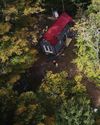
WOOD TRIM IS SUPPOSED TO PROVIDE A FINISHING touch to a room. But it doesn't always work out so neatly. And if you've ever tried to install trim and been frustrated by a poor fit where two pieces meet, say in an open miter or open cope, you're not alone. With 40-plus years of experience cutting trim, I can name at least a couple dozen reasons why those pieces won't join up so nicely. And I've developed these solutions-for joints that are mitered and coped to solve most of your problems.
You need to get your head and your eye into the job first. A warmup cut is always a good idea. Cut the trim a little long and see if the piece fits, and then recut to get it dialed in for a perfect joint.
OPEN MITERS
A miter is an angled cut on the ends of the two pieces of trim you're joining. The cut angle is half of the total number of degrees in the angle they'll form (as you look at them head-on) once they meet. So if you have two pieces of trim meeting at a 90-degree corner, each miter is cut at 45 degrees.
There are three types of open miters. A miter can be open at the bottom of the joint, across its face, or at the top of the joint. Before assuming the problem is with the saw, the saw's adjustment, or the blade, always check the surface (or surfaces) where the trim is being installed. Bumps and hollows there could cause the trim to not fit properly.
Here are what the three problem miters look like:
THE SOLUTIONS
First, check the simple and most obvious things. Does the miter saw have a new, sharp blade on it, or is it dull? Is it the correct blade? For example, a 10-inch miter saw will need a blade with at least 60 teeth. A 24-tooth blade for cutting framing lumber is ridiculously rough for this work. Next, check the saw and whether it's truly cutting at the angle that its pointer indicates.
This story is from the November - December 2022 edition of Popular Mechanics US.
Start your 7-day Magzter GOLD free trial to access thousands of curated premium stories, and 9,000+ magazines and newspapers.
Already a subscriber ? Sign In
This story is from the November - December 2022 edition of Popular Mechanics US.
Start your 7-day Magzter GOLD free trial to access thousands of curated premium stories, and 9,000+ magazines and newspapers.
Already a subscriber? Sign In

ONE OF THE 'GREATEST THREATS' TO THE PACIFIC NORTHWEST ISN'T WHAT YOU THINK.
EXPERTS ARE PREPARING THE REGION AGAINST THE THREAT OF DANGEROUS VOLCANIC MUDFLOWS, KNOWN AS LAHARS, WHICH COULD INUNDATE THE COMMUNITIES SURROUNDING MT. RAINIER IN AS LITTLE AS 30 MINUTES.

THE WORLD'S TOUGHEST ROW
They rowed 3,000 miles across the Atlantic, battling unpredictable weather, chaotic seas, and finicky equipment. But what they discovered gave them profound new insights into the power of the ocean.

HOW TO DIY OFF-GRID SOLAR
SPEND THE TIME UP FRONT AND PLAN IT CAREFULLY TO AVOID DISAPPOINTMENT

Are We on the Verge of an ARMS RACE in SPACE?
RUMORS OF A RUSSIAN SPACE NUKE, ALONG WITH OTHER SATELLITE-TARGETING WEAPONS, HAVE MADE GEOPOLITICAL TENSIONS EXTEND INTO ORBIT.

Fresh Fingerprints on an Ancient Statue
A CLAY FIGURINE HAS SPENT MILLENNIA incomplete, waiting at the bottom of a lake for its long-dead craftsman to finish the Iron Age-era statuette.

Quantum Entanglement in Our Brains
IT HAS LONG BEEN ARGUED THAT THE human brain is similar to a computer. But in reality, that's selling the brain pretty short.

The Tools of Copernicus
WAY BACK IN 1508, WITH ONLY LIMited tools at his disposal, Nicolaus Copernicus developed a celestial model of a heliocentric planetary system, which he described in hist landmark work De revolutionibus orbium coelestium. It was a complete overhaul of our conception of the universe-one that, unfortunately, earned him the ire of the Catholic church for decades after his death-and forever changed the way we look at the stars.

Building a Sixth-Generation Bomber Raptor
THE GLOBAL COMBAT AIR Programme (GCAP)-a project by the U.K., Italy, and Japan to develop a sixth-generation stealth fighter-has been busy at the drawing board reshaping its vision of the future of air warfare. And judging by the new concept model unveiled at this year's Farnborough air show, that future has big triangular wings.

The Electroweak Force of the Early Universe
TODAY, THE UNIVERSE AS WE KNOW IT IS governed by four fundamental forces: the strong nuclear force, the weak nuclear force, electromagnetism, and gravity.

This Ancient Fossil With a Brain and Guts
WE KNOW WHAT FOSSILS LOOK like. For example, typical dinosaur fossils are bones turned to stone and preserved from the passage of time, located, if we're particularly lucky, in large collections that can be reassembled to represent the beast they used to prop up in their entirety.